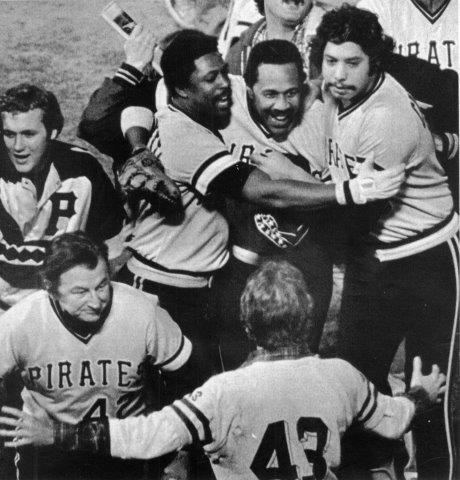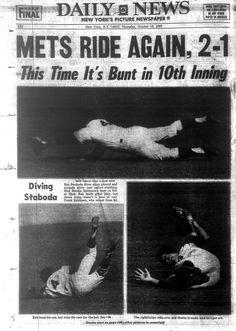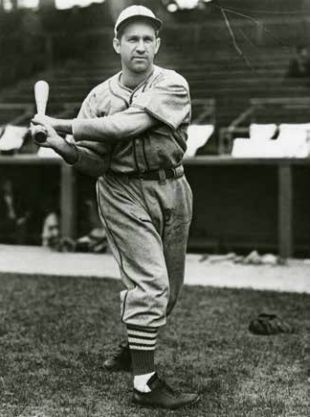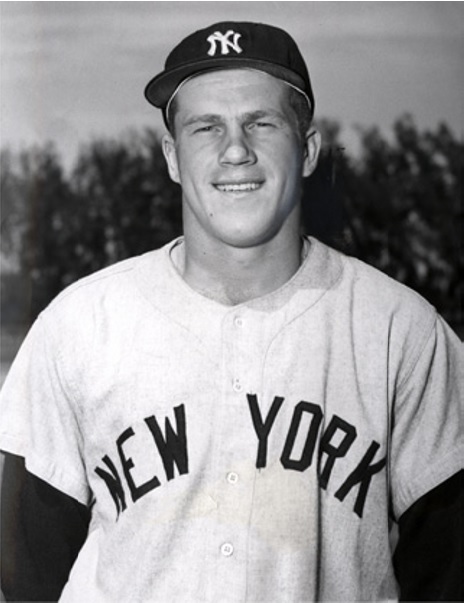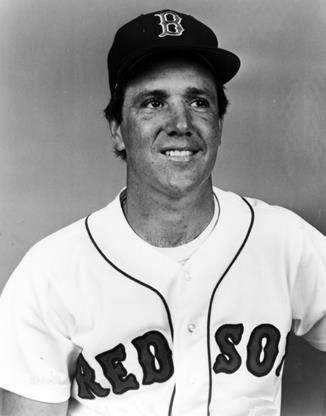October 21, 2015: Daniel Murphy’s homer in sixth straight game sends Mets back to World Series
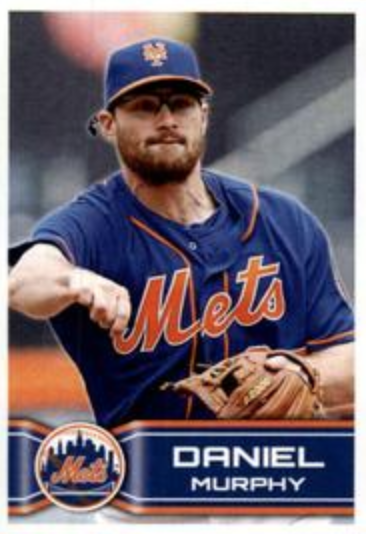 A single major-league baseball season spans … well, seasons … and for that reason alone both good stretches and bad can often seem never-ending. Just as players are prone to streaks and slumps, so too are teams as a whole or any component thereof. For the 2015 New York Mets, pitching and hitting were on vastly different trajectories for much of the spring and summer, until a single player acquisition at the trade deadline invigorated the club and set it on the path that led eventually to fall baseball and Game Four of the National League Championship Series.
A single major-league baseball season spans … well, seasons … and for that reason alone both good stretches and bad can often seem never-ending. Just as players are prone to streaks and slumps, so too are teams as a whole or any component thereof. For the 2015 New York Mets, pitching and hitting were on vastly different trajectories for much of the spring and summer, until a single player acquisition at the trade deadline invigorated the club and set it on the path that led eventually to fall baseball and Game Four of the National League Championship Series.
Yoenis Cespedes, who came to the Mets via trade with Detroit as the final minutes ticked down before the trade deadline on July 31, did not singlehandedly resuscitate the New York offense. But his arrival, coinciding dramatically with a crucial three-game series against Washington, provided a much-needed spark to a struggling batting order and had a galvanizing effect on his teammates. However, the Cuban outfielder’s contribution, though critical to the pennant drive, was only the prelude to a record-setting postseason display from a hitherto unexpected source.
The Mets bolted from the gate in 2015, and were in first place in the National League East with a 16-8 mark on May Day. Then came injuries to David Wright and Travis d’Arnaud, and what had been a tepid offense became one of eye-averting futility. Through July New York was last in the league in runs scored; on one inglorious day the players batting fourth and fifth had batting averages of .170 and .179, respectively, only the second time in the live-ball era that a team sported such woeful numbers in the heart of the order.1 Through it all, the starting rotation featuring Matt Harvey, Jacob deGrom, Noah Syndergaard, Steven Matz, and Bartolo Colon kept the Mets in contention, despite the dearth of run support. “The Mets,” wrote Mike Pesca of the imbalance between offense and defense, “were like restaurant owners with a team of brilliant young chefs turning out four-star dishes, only to have a bumbling wait staff trip and spill Consomme in customers’ laps.”2
Despite its struggles, the team had a sub-.500 record only once after the season’s fifth game, at 36-37 on June 24, and that lasted only a day. Then came the Cespedes deal. He didn’t suit up for the first Washington game, a 12-inning 2-1 win that ended on a walk-off home run from Wilmer Flores. He was in the lineup for the subsequent 3-2 and 5-2 victories, after which the teams were tied for the NL East lead. One day later the Mets had sole possession of first place, and there they stayed. New York went 38-22 after the trade, with five of the losses following the September 26 division clincher over Cincinnati.
The Chicago Cubs came into the NLCS with a groundswell of national support. After 100 years without a pennant, a new ownership team took over in 2009, and two years later Theo Epstein and Jed Hoyer came aboard. The new administration assured fans the transformation of the Cubs wouldn’t happen overnight, and it didn’t – the Cubs remained losers during the first three years after Epstein took over as president of baseball operations, finishing last in the Central Division twice. They won a few more games each season, however, and in 2015 broke loose, posting a 97-65 mark and finishing third behind St. Louis and Pittsburgh. A wild-card win over the Pirates preceded a four-game dispatch of the Cardinals, setting up their meeting with New York.
But storylines change as events dictate. While the Chicago team’s narrative had an obvious hook, it was in the Dodgers-Mets Division Series that the most compelling individual achievement of the postseason got underway. Leading off the fourth inning of a scoreless affair at Dodger Stadium, second baseman Daniel Murphy deposited a Clayton Kershaw fastball deep into the Mets bullpen. New York went on to win the game, 3-1, and at the time the story was that Kershaw had lost rather than that Murphy had gone deep. But the Mets went on to take the series in five, and Murphy homered in Games Four and Five – off Kershaw again, and Zack Greinke.
And then he just kept on slugging. The Mets, behind Harvey, won Game One of the NLCS, 4-2, a task made easier by Murphy’s first-inning homer. He duplicated the feat, a two-run shot this time, in a 4-1 victory the following night. In Chicago for Game Three, Murphy drew the Mets even in the third stanza with still another long ball, then singled and scored a run in the seventh as New York pushed the Cubs to the brink of elimination. Going into Game Four, Murphy had homered in five straight postseason games, tying him for the record set in 2004 by Carlos Beltran.
In contrast to the regular season, which had an obvious turning point, Game Four of the NLCS had no such pivotal moment; before starter Matz had so much as toed the Wrigley Field rubber for the first time, his teammates had given him all the runs the Mets would need in the game. Curtis Granderson opened matters with a single, but Wright struck out and Murphy fouled out. Chicago’s relief at retiring Murphy was almost palpable, but Cespedes drew a walk.
Then Lucas Duda – who, commentator Ron Darling informed the national television audience, had “put on a display, home run after home run,” during batting practice3 – silenced the crowd as surely as if he’d cut a wire, drilling a Jason Hammel fastball into the center-field seats. The Mets, having won five of six to that point in the postseason when striking first, jumped in front, 3-0. Two pitches later the lead was four, courtesy of an opposite-field clout by d’Arnaud. A hit batsman, a misplayed fly ball, a stolen base, and a tricky drive into the right-field corner followed, and though they didn’t add to New York’s advantage, they did suggest a relentlessness that didn’t bode well for the home team.
Travis Wood took over for Hammel in the second with one out and one on, surrendered a single to Murphy, and struck out Cespedes. This brought Duda to the plate again, who once more worked the count to 3-and-2 before slapping a double into the right-center-field gap. Wright and Murphy scored, giving Duda five runs batted in and the Mets a 6-0 lead. The big first baseman, who entered the game with three hits in 24 postseason at-bats, hit it so sharply that Chicago shortstop Javier Baez was unable to do more than pivot and watch as the ball caromed off the grass 20 feet past him.
Matz failed to earn the win, leaving one out shy of the required five innings after Dexter Fowler and Jorge Soler hit back-to-back two-out singles. Colon, pitching out of the bullpen, ended the threat by striking out Kris Bryant and then tossed a scoreless sixth to get credit for the win.
The middle innings didn’t see an expansion of New York’s lead – the Cubs, in fact, cut into it with a run in the fourth – but the impression deepened of a team on the cusp of committing additional mayhem. The Mets threatened in the sixth, but a leadoff triple by Wilmer Flores was wasted. In the seventh they loaded the bases with one out, starting with a double to the center-field wall by the lethal Murphy, but again were unable to score.
Then came the eighth, and Murphy’s ascent into the record book. Facing Fernando Rodney with two outs and a man on, he squared up a 1-and-1 fastball and lifted it into the netting atop the fence in right-center field. In addition to capturing the consecutive games home-run record, Murphy’s seven total homers against Los Angeles and Chicago tied him for fourth on the all-time list with Troy Glaus, Melvin Upton, and Jayson Werth, trailing only Beltran, Barry Bonds, and Nelson Cruz with eight each.4
With an 8-1 lead and only six outs separating the Mets from a sweep, the two-run homer by Kris Bryant in the bottom of the inning was more a harbinger of the next season than a serious threat to extend the current one. The fans cheered, but 30 minutes later most were on their way home, and the Mets were on their way to Kansas City and a World Series meeting with the Royals. Though Murphy’s historic spree came to a halt and the Mets fell to the Royals in five games, Game Four of the 2015 NLCS remains a high point in franchise history.
This article was published in “Met-rospectives: A Collection of the Greatest Games in New York Mets History“ (SABR, 2018), edited by Brian Wright and Bill Nowlin. To read more articles from this book at the SABR Games Project, click here.
Sources
In addition to the sources cited in the Notes, the author also accessed Baseball-Reference.com and the Ultimate Mets Database.
https://www.baseball-reference.com/boxes/CHN/CHN201510210.shtml
https://www.retrosheet.org/boxesetc/2015/B10210CHN2015.htm
Notes
1 Patrick Dubuque, Sam Miller, and Jason Wojciechowski, Baseball Prospectus 2016: The Essential Guide to the 2016 Season (Nashville: Turner Publishing Company, 2016), 319.
2 Ibid.
3 Major League Baseball on TBS: youtube.com/watch?v=8gaf3hb92Ww.
4 Victor Mather, “Daniel Murphy Breaks a Record With Another Postseason Homer,” New York Times, October 22, 2015.
Additional Stats
New York Mets 8
Chicago Cubs 3
Game 4, NLCS
Wrigley Field
Chicago, IL
Box Score + PBP:
Corrections? Additions?
If you can help us improve this game story, contact us.



